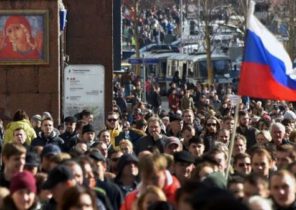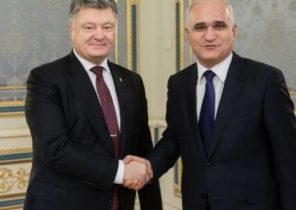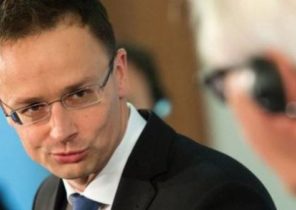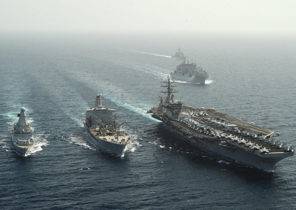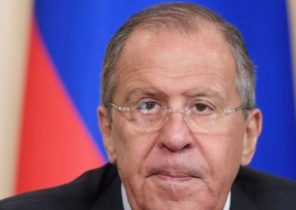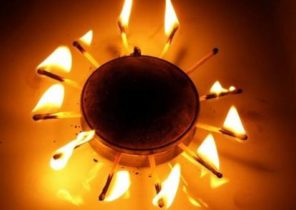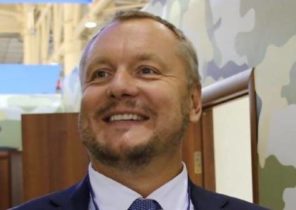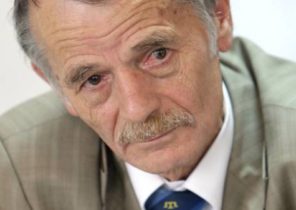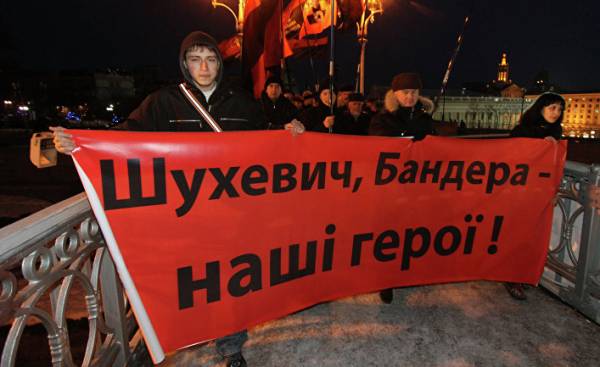
Historical memory and national reconciliation issues are pressing, especially when they deal with big wars, mass murders and suffering of millions in the recent — recent — past. The memory of Ukraine on its Soviet history is associated primarily with a huge number of victims of Bolshevik and Nazi regimes and wars within the country itself. The two most murderous totalitarian regimes of Europe killed and intimidated, along with millions of other victims, the millions of Ukrainians living in the bloody land (as he described them Timothy Snyder). At the same time, hundreds of thousands of Ukrainians in varying degrees, collaborated with both ruthless killing machines that has become a significant problem for the Ukrainian politics of memory.
Post-Soviet history and the historical memory of Ukraine
It’s a scary intellectual, cognitive and emotional challenge is compounded by the fact that Kiev is currently engaged in a war of survival with the main negative hero of your national memory — Moscow. For the most part ambitious, cynical and ruthless foreign policy of the Kremlin and the accompanying public debate, and have recently become again the possession of overt aggressive imperialism and ambivalent approach to the Ukraine on the verge of psychopathology. This is further complicated by the significant number of people living in Ukraine, representatives of the Russian minority — about 17% of the population, some of which are loyal to Moscow, not Kiev. Deliberate manipulation of the national memory, contemporary history and international relations — not least in the Polish media and social networks — have become an integral part of the so-called hybrid war of Russia against Kiev. Kremlin attacks on the Ukrainian nation occur daily, with many military and non-military instruments of hard power and humanitarian weapons. He is actively speculating on controversial historical issues, and seeks to destroy the Ukrainian state is not so much outside as inside.
This already kind of a scenario, it becomes even more unusual in view of the far-reaching consequences of the Ukrainian politics of memory in the context of international relations. This applies, above all, interpretation, evaluation, and perpetuating the memory of the (sadly) known faction of Bandera’s Organization of Ukrainian nationalists (OUN(b) is prohibited on the territory of the Russian Federation — ed.) of the interwar period and during world war II. Officially approved the classification of the OUN, which currently prefers the ruling class and a significant part of the intellectual elite of Ukraine, is causing deep divisions among the Russian-speaking population of Ukraine, its foreign partners and Pro-Western intelligentsia. OUN was normative (though not geographically) anti-Western and at the same time explicitly anti-Soviet. Today, many Ukrainians perceive it as anti-totalitarian and advocated the freedom and independence of the Ukrainian state. But ultra-nationalist, ethnically cleansed and monistic one-party state identified by the Bandera faction, at least until the beginning of 1940-ies itself would become illiberal and totalitarian dictatorship.
The leaders and ideologues of the OUN held ethnocentric and xenophobic position. At the same time, many of them gave their lives and the lives of their families in the struggle of Ukraine for independence. Some Ukrainian nationalists, including at least one brother of Stepan Bandera, was killed by the Nazis, but most were killed in battle against the Stalinist regime. And founder of the OUN, and the leader of her cult were victims of a demonstration killings committed by Soviet secret services in the West Eugene Konovalets was assassinated in 1938 by the NKVD agent in Rotterdam and Stepan Bandera in 1959 by a KGB agent in Munich.
While in other countries the issues of national memory can be too controversial for the Ukrainian state, they represent a rare, but dangerous combination of internal divisions and international explosion. Therefore, it was surprising that after the Euromaidan, Kiev has decided to pass the main official governmental institution responsible for issues of historical memory, in the hands of a group of relatively young activists, the presence of academic regalia which was little known. Ukrainian Institute of National memory (winp) in the structure of the Cabinet of Ministers of Ukraine was in 2014, placed under the control of the circle of nationalist-minded writers, previously almost did not have Affairs with Ukrainian scientific institutions and with limited experience of international contacts.
The current staff of the Institute closely associated with a small but active non-governmental organization called the Centre for research liberation movement (CDVR). The main purpose of the centre’s activities in the field of publishing and media is justifying the promotion of the OUN public opinion and official hagiographic rhetoric against its leaders in wartime: Stepan Bandera, Roman Shukhevych, Yaroslav Stetsko, and others. Of the Institute combined their current campaign of de-communization with a comprehensive nationalization and tendency to be partial “banderizatsii” in public memory and official discourse. It actively supports CDWR presenting the Ukrainian ultra-nationalist movement in wartime as the apotheosis of patriotism and love of freedom. While winp directly affect the Executive power of Ukraine, CDR affects its legislative processes, as a member of the famous Alliance of civil society organizations of Ukraine under the name “Reanimation package of reforms”, dedicated to the development and implementation of laws on reform in Parliament.
The strangeness of the activities of the Institute and CDR in the field of publishing, journalism, education, behind-the-scenes machinations, place names, etc. is that all this comes amid a surge of critical studies of the OUN in the academic institutions of Ukraine, the EU and North America over the past decade. In Germany, for example, over the past few years has appeared, among other publications, three book-length monographs, details covering specific aspects of the history of the OUN. Honorary Professor of the University of Hamburg Frank Golczewski (Frank Golczewski) in 2010 published a 1000-page work “the Germans and the Ukrainians” on German-Ukrainian relations in the period between 1914 and 1939, devoted to, among other things, the creation of the OUN and its interaction with the pre-war Third Reich. Researcher at the Free University of Berlin Grzegorz Rossolinski-Liebe (Grzegorz Rossoliński-Liebe) in 2014 published a 650-page biography of Stepan Bandera “the Life and afterlife of a Ukrainian nationalist,” which outlined why the Bandera movement must be viewed as a transformed Ukraine by the Eastern European fascism. In 2015, the Professor of Halle-Wittenberg University Kai Struve published a 700-page monograph about the past in Western Ukraine in the summer of 1941 anti-Jewish actions, showing deep involvement of the OUN anti-Semitic violence in the first weeks of the German-Soviet war.
The content and results of an apologetic and hagiographic politics of memory of Ukraine, the ongoing government of the Institute and non-governmental CDWR are a problem, primarily by themselves. They interfere with the reconciliation of the Ukrainians with their recent past and prevent the emergence of a single Ukrainian political nation because of deep resentment on the part of the Russian-speaking part of the country. The activities of the Institute and CDWR have been criticized from the point of view of historical science, international relations, national memory, social cohesion, ethics and moral responsibility. In addition to these angles, they can also be regarded from the point of view of priorities of foreign policy of Kiev, especially given Ukraine’s aspirations to deep European integration.
The historic policy of the Institute and publishing CDWR relate to four key themes of post-war public life of the West, relevant in the current international context of Ukraine:
(1) antinationalist motive of European integration,
(2) the centrality of the Holocaust in modern Western thinking,
(3) modern criteria for distinguishing between scientific and non-scientific discourse, as well as
(4) the importance of Poland in the Affairs of Eastern Europe, and Germany in European politics.
Effective impact of the Institute, CDR and their supporters on public opinion and the international image of Ukraine over the past two years creates the following problems for external relations of the Ukrainian state:
Ukrainian nationalism and European anti-nationalism
First, the desire of the Institute and CDR to put the radical nationalist OUN Bandera at the forefront of national memory of Ukraine is contrary to the primary impetus of European integration. Taking into account the fact that the creation of NATO was due to the anti-Soviet motives, the European community and later European Union, was an antinationalist projects, as shown by the violent antipathy of the radical nationalists of Europe towards Brussels. The starting point of post-war European reconciliation and unification was an attempt of France and Germany to overcome their centuries-old conflict. The integration of Europe began in response to the spread of more radical nationalist sentiment in pre-war and interwar Europe that two world wars were motivated by radical ethno-centrist European movements, primarily German fascism.
Against this background, the spread of positive references to the OUN — as a form of extreme nationalism of the interwar and wartime — in the public life of Ukraine after the Euromaidan represents a challenge to the basic principles of the EU. It is not surprising that Brussels has raised serious concerns in the February 2010 resolution, which States that “the European Parliament deeply regrets the decision of the outgoing President of Ukraine Viktor Yushchenko to assign posthumously to Stepan Bandera, leader of organization of Ukrainian nationalists (OUN) which collaborated with Nazi Germany, the title of “National hero of Ukraine” and hopes that the new Ukrainian leadership will reconsider such decisions and will maintain its commitment to European values”. Recently, however, it became clear that this resolution had no impact on the political and intellectual elite of Ukraine. Russian aggression against Ukraine has prompted many members of the EU to be more careful in the matter of criticism of Kiev, because the current grace period will end sooner or later.
Ukrainian nationalism, the Holocaust, and postwar West
Second, a particularly problematic aspect of the history of the OUN are his anti-Semitic prejudices and activities, as well as the memory of Ukrainians about the ideas and behavior or lack thereof. It should be recognized that judeophobia, unlike German Nazism, is not a major aspect of xenophobia OUN. However, many Ukrainian extreme nationalists of the wartime thought of Ukrainian Jews, the enemies of the country, though minor. The anti-Semitism of the OUN motivated its members, at least some, to participate in the Holocaust as either accomplices of Germany, or independent hunters of Jews Third Reich in the occupied territories. Between 1941 and 1944, the years Ukrainians killed thousands of Jews, many of whom were killed, most likely, members of the OUN or radicalized soldiers of its military wing — Ukrainian insurgent army (UPA prohibited in Russia, ed.).
In Ukraine, only a few political and intellectual leaders seem to understand the importance of remembering the Holocaust in the formation of post-war Western intellectual and political discourse. The inability of the Ukrainian politics of memory to find an adequate solution to this problem will have devastating consequences for international relations of Ukraine. The more the Western public will have about the involvement of some members of the OUN in the Holocaust — for example, crimes committed in the summer of 1941, the more controversial will be the current glorification of the Ukrainian state, OUN and its leaders. Yet awareness of the West about these events is limited, as most of the discussions on the Ukrainian language, which is owned by only a handful of Western observers.
Public discussion of difficult issues, among other things, often spoil pompously smear campaign by the Kremlin’s media and purposefully biased narratives of the OUN. The international debate also suffer from numerous Amateur reviews of the West, which, in turn, are often based on Soviet secondary sources and/or historical manipulation of post-Soviet Russia. Frequent factual inaccuracies and erratic historical allegations made by various ill-informed journalists and activists — especially in relation to Bandera, who spent most of world war II under arrest, the Germans play a detrimental role in Ukrainian public discussion of the events. Currently, a large number of incorrect assessments, false generalizations and unsubstantiated claims, offered by various non-experts and/or politically engaged participants both in Ukraine and beyond, with great pleasure going out and analysed thoroughly by the representatives of the Institute and CDR and other supporters of the OUN during the scientific conferences, international discussions and television talk shows. They have generated widespread among Ukrainian intellectuals and politicians believed that the public in the West is fundamentally ill-informed about the newest history of Ukraine or even full zombiruetsya Soviet and post-Soviet Russian propaganda.
However, scientific studies over the last few decades, European and North American universities is described, where associated with the OUN Ukrainians participated in the Holocaust or not. These peer reviewed studies conducted at prestigious institutions of such countries as USA, Canada, Germany, Poland and Sweden, is not affected by the various campaigns of the Kremlin. From these publications it is clear that anti-Semitic ideas and the activities of the OUN was the result not only of German influences, beginnings and incitement. They were also due to homegrown Ukrainian prejudice against Jews in particular crypto-racist conspiracy theory called “Judeo-Bolshevism” — the obsession of some Communist leaders of the last Jewish families.
Some of the documents, which were written the plans of the OUN to cleanse Ukraine of Jews, among other nationalities, were taken in the spring of 1941, before the attack by Germany on the Soviet Union. To 1930-m to years, xenophobic attitudes of the OUN was complemented by anti-Jewish writings of Dmytro Dontsov, the founding father of modern Ukrainian extreme nationalism and translator Benito Mussolini and Adolf Hitler. Although don did not become a member of the OUN in the 1930-ies his family to the Nazi leaflets were part of the ideological formation of the Ukrainian nationalism, and now have some influence on the Ukrainian intelligentsia.
In the coming years, recent research results, published in English and German, will be distributed among the major epistemic communities of Western scholars of international fascism and genocide in General, and Holocaust-era and Second world war. The new findings, currently published in Western languages, will gradually be included in the comparative study of nationalism, European history textbooks, the curricula of universities, international research in the field of Holocaust history, as well as the media. They often lead to confusion between an apologetic Ukrainian intellectuals on the one hand and Western experts on Ukraine on the other.
Sooner or later the wider Western public will become aware of the details of the Ukrainian interwar anti-Semitism, partial participation of the OUN in the Holocaust and openly, relaxed and trying to clear himself of the politics of memory of Kiev against the OUN and its leaders. As a result, the image of Ukraine in the eyes of the West will be jeopardized in the long term. The resolution of the European Parliament in 2010 stated that such a situation could cast doubt on such an important project as the gradual integration of Ukraine into the EU and NATO.
Ukrainian nationalist journalism and research OUN
The third problematic aspect of the current Ukrainian politics of memory — is it unscientific motivation. Of course, Ukraine has a number of recognized historians on an international scale, published in reputable media sources critical reports regarding the OUN or the information in prestigious foreign universities or research centers. Among them Jaroslav Gritsak, Alexander Zaitsev of the Ukrainian Catholic University in Lviv, Andriy Portnov from the Humboldt University in Berlin, Georgy Kasyanov from the Kiev National Academy of Sciences of Ukraine, and these are just a few. There is also belonging to the Ukrainian Diaspora scholars, published a very important study of the OUN and political memory in post-Soviet Ukraine, for example, John-Paul Himka from the University of Alberta, Miroslav Shkandrij from the University of Manitoba, Marco By of the University of Toronto and Ivan Kachanovsky from the University of Ottawa.
Most importantly, over the last decade has increased the number of young Ukrainian scientists, which in the original critical of scientific research on the OUN and related issues in a respectable peer-reviewed publications, and receiving grants from prestigious Western research institutes. Among them: Elena Petrenko from the Ruhr University Bochum, Yuri Radchenko of the Kharkiv Center for studies of interethnic relations of Eastern Europe, Yulia Yurchuk from the University Sodertorn in Stockholm, Anton Shekhovtsov from the Institute for human Sciences in Vienna, Olesya khromeychuk from the University of East Anglia in Norwich or Ivan Gomza of the famous Kyiv-Mohyla Academy.
Although none of these scholars pressure on the part of Kiev is not exposed and is free to distribute their research, their influence on official government policy is limited, and the work is not sufficiently covered in the media and intellectual debate on OUN. A dominant position in public historical debates on OUN in Ukraine are state employees of the Ukrainian Institute of national memory, the activists of the Center of researches of liberation movement, and like-minded local authorities. This is despite the fact that only some of them have the appropriate academic degrees. Apparently, most of them have not had the opportunity or interest to publish their research in scientific journals or present your research work to an expert audience at the international scientific conferences. None of them had notable academic achievements or comparative research in different cultures. In the end, outside of Ukraine they are not well known.
Director and CDWR winp Vladimir vyatrovich is undoubtedly a kind of celebrity because he was the subject of observations and discussions on the pages and websites of publications such as The Nation, Foreign Policy and Foreign Affairs. In 2010-2011, viatrovych received an invitation as a fellow in the Institute of Ukrainian studies at Harvard University. Invited him, apparently, as a celebrity, not in the traditional scheme of financing of scientific research. Viatrovych had, and apparently still does not have the appropriate peer-reviewed academic publications, i.e. texts of peer-reviewed research journals or book series. But in 2008-2010, viatrovych was the head of the archive of the security service of Ukraine — a high position in the Ukrainian official cultural circles, for which it is at Harvard, apparently, invited.
In 2011, together with the publishing Department of the Kyiv-Mohyla Academy (a prestigious Ukrainian University) he published an apologetic book about the mass killings of members of the OUN and the Ukrainian insurgent army, the Polish civilians in the Western Ukraine in 1943-1944. However, in the period viatrovych himself was connected with this University, the then President, and later Minister of education, Serhiy Kvit has previously written a hagiography on the above-mentioned proto-fascist writer and inspirer of the OUN, Dontsov. Book Vyatrovich has become the object of harsh criticism and caustic ridicule on the part of some academic experts, who considered themselves bound to study his unremarkable manuscript, written at Harvard University printed in the Kiev-Mohyla Academy and the since become a stumbling block in Ukrainian-Polish relations.
Strangely low level of representation of respected Ukrainian historians in shaping the politics of memory in Ukraine, it may seem a minor issue, but to lead, however, to the far-reaching consequences. As recently pointed in a completely different context, Jean Pisani-ferry: “Science requires more — and more rigorous — attention than, say, business or government. It is, in fact, is an example of qualitative methods of validation studies and discussion of policy proposals. In scientific circles errors occur regularly, but correct they are faster and more systematically than in other areas. The collective nature of scientific confirmation of the truth also provides safeguards against the involvement particularly of stakeholders”.
The spirit of rationalism, of criticism, universalism, agnosticism and pluralism that prevails in the universities of Europe, North America, etc., makes them perhaps the most archetypal Western institutions. Unlike post-Soviet societies, working in famous universities and scientific research institutions, prominent scientists have in Western societies a special status. They — and not influential clerics, experts, government officials, journalists, military, popular writers, etc., often appear in public debate as inspirers and sometimes referees.
Non-scientific personnel, communication and publishing policy of the Institute will be faced not only with the works of Ukrainian and non-Ukrainian scholars, but also with the positions of official representatives of the Western States. European and American politicians do not take arguments, however well formulated they may be, from writers who can demonstrate a strong Patriotic feelings, but do not have the appropriate academic degrees. The West does not take seriously the debate that cannot refer to the publication of their scientific papers in renowned scientific journals presented at international scientific conferences and have no influence in the field of scientific discipline and respect in the epistemic communities to which the self-proclaimed experts yourself credited.
Ukraine’s national security and destructive politics of memory
Fourth, the primary and most significant political issue of the emerging Canon of official Kiev in relation to the Second world war is its fundamental unacceptability to States such as Poland, Germany and Israel, which are of particular importance to the interpretation of the history of Europe 1939-1945. For Poland is not negotiable the fact that the mass murder of members of OUN/UPA of Polish civilians in the Western Ukraine in 1943-1944. And Germany precludes any suggestion that Nazi collaborators should be seen as the heroes of the war and that, for example, the leader of OUN/UPA Roman Shukhevych, who once was an officer in the Wehrmacht and later a member of salzmanns battalion, should be honored as a Martyr. For Israel and international Jewish organizations inconceivable insult is the idea that anti-Semitic organization like the OUN, many of whose members participated in the Holocaust, could lead the process of formation of post-Soviet Ukrainian nation.
Although Israel believes some Ukrainians may be regarded as unimportant, the relevance of the positions of Poland and Germany towards Ukraine more obvious. So far Poland is the closest international partners of Ukraine and the main defender of its interests in the European Union and NATO. Recently expressed about Pro-Ukrainian position of Germany in the EU played a decisive role for the introduction and extension of penalties related to the secret intervention of Russia in the Donbass. The dubious politics of memory in Ukraine has a growing pressure on the Pro-Ukrainian political and social force as in the above, and in other countries. In Germany, for example, there are many left-wing and right-wing Pro-Russian political groups and the business community, skillfully using the growing cult of Bandera in Ukraine. They actively use partly correct the actual material along with falsified information regarding the history of OUN and its current glorification to argue in favor of meeting the aspirations of the Kremlin to the separation of the West and of Ukraine and the Russian hegemony over it.
In Poland, the most skeptical towards Ukraine, the group consists of the descendants of the victims of the Ukrainian ultra-nationalist violence and ethnic cleansing in wartime, which affected the Polish community in General. In July 2016 misunderstood policy of Ukraine after Euromaidan had pronounced effects when the Parliament of Poland recognized the Armenian genocide the mass killings of members of the UPA in Volyn and Galicia in 1943-1944. Obviously, increasing tensions between Kiev and Warsaw also contributed to the recent internal developments in Poland. However, the Ukrainian factor has become a necessary additional condition in the process of the deterioration of Polish-Ukrainian relations in the same direction and with the same speed and in the period from 2014 to 2017.
Ukrainian political scientist Anton Shekhovtsov Vienna the following summed up the fateful the Declaration of the Polish Parliament in 2016: “This step follows a visit by members of the ruling Polish party “law and justice” in Ukraine in the hope of convincing the Ukrainian Parliament to stop to glorify the murderers of poles (in the era of war). This situation has arisen on the background of a division of opinion on this issue: those who held moderate views, trying, it seemed, to keep radical parties and prevent the adoption of the Volhynia genocide. Visited Ukraine Polish MPs held moderate views, but the common language with Ukrainians could not find. The last straw was the renaming of one of streets of Kiev in honor of polonophobia Ukrainian fascist Stepan Bandera (in July 2016), and moderately-minded Polish MPs are unable to restrain radicals and, therefore, the adoption of the act of genocide of Volhynia 1943-1944. The victory was won by the radicals on both sides; bilateral Polish-Ukrainian relations suffered a serious blow, the Kremlin has remained in positive territory”.
Of course, winp and CDWR is not the only Ukrainian institutions responsible for these and other disturbing policies of memory. Due to its apologetic activity they have made a significant contribution to the deterioration of international relations of Ukraine starting from 2014. Statements of the Director and other members of the Institute have particular weight, as they are the official representatives of government agencies. The staff of the Institute and CDR, as well as hundreds of other similarly oriented Ukrainian politicians, journalists, historians-Amateurs and activists, Amateurs, contribute to the current tensions in Polish-Ukrainian relations, thanks to both their actions and inaction.
Over the past 25 years, the builders of the Ukrainian nation, being in search of role models, focused mainly on the tragic and heroic aspects of the fate of Ukraine in the Second world war. With great reluctance they faced with the problematic sides of the modern history of their country. Many still do not understand that some practical conclusions must arise from the verbal recognition of the existence in the recent past Ukraine’s “dark side.” Today rarely denied the participation of Ukrainian nationalists in the Holocaust or mass murder of poles in 1945-1944. Nevertheless, since 1991, a significant part of the public memory of Ukraine about world war II looks as if these and other crimes of the OUN did not have a place to be or would not be at all associated with the ideology of the OUN, justifying a military context or incitement on the part of Germany (which of course happened often).
On the contrary, apologetic Ukrainian polemicists regularly respond to criticism from domestic and foreign observers to the fact that in Soviet times was known as “criticism in response to criticism”: what about the attempts of Poland to whitewash his past? And what about the selective memory of Israel? And what about the crimes of other national liberation movements?… Even if such questions and justified, they simply distract attention from the Ukrainian topics and switch to visible foreign policy issues, especially in Polish-Ukrainian relations created by the official memory politics of Ukraine.
Neither principle, to answer criticism on the criticism, nor nihilism, nor isolationism, nor escapism will not help the Ukrainians to soften the accumulated confusion arising from the glorification of Kiev extreme nationalists of the wartime in the EU, North America and other parts of the world. Different mistakes incorrectly understood the politics of memory of Ukraine, especially in the last two and a half years, now have become the easy way of manipulation for propaganda, Trustees and supporters of the Kremlin. They undermine the confidence of major foreign partners of Kiev in its efforts to make Ukraine a modern European state in conditions when the Ukrainians most in need of their help.
Andreas Umland is a senior research fellow, Institute for Euro-Atlantic cooperation in Kiev, the chief editor of the book series “Soviet and post-Soviet politics and society”, consulting editor of the journal, devoted to the Soviet and post-Soviet politics and society. Both publications are distributed outside of Europe publishing Columbia University Press.
